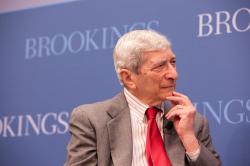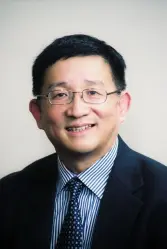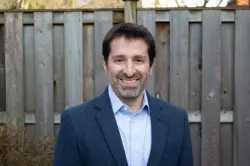On November 29, 2023, Henry A. Kissinger, who served as secretary of state and national security advisor in the Nixon and Ford administrations, passed away. Brookings experts reflect on his legacy.
Adrien Chorn and Natalie Sambhi
For those with a connection to Indochina, Henry Kissinger was a merciless juggernaut on the international stage. As a power-hungry “realist,” he helped orchestrate one of the world’s most destructive bombing campaigns during the “secret war” in Laos and Operation Menu in Cambodia. Recent estimates say that the United States dropped at least 2.5 million tons of ordnance over the two small countries from 1969-1973 (Allied forces dropped a similar tonnage of munitions in the entire European theater from 1940-1945).
Laos, from then on the most bombed country per capita in the world, continues to suffer over five decades on from unexploded ordnances (UXOs) left from U.S. carpet bombings. Since 1973, American UXOs have killed over 25,000 people, 40% of them children. Laos, with its looming debt crisis, still struggles to overcome such an impediment on its economic development.
In Cambodia, historian Ben Kiernan estimates that the bombing campaign killed nearly 150,000 civilians, and American UXOs have contributed to the over 64,000 casualties and 25,000 amputees recorded since 1979. Kiernan and others like political scientist Sophal Ear also have argued that these bombings, in addition to the U.S. support for the coup that overthrew the late Prince Norodom Sihanouk, contributed to the rise in support for the Khmer Rouge in Cambodia, which later ruled over a genocide of approximately 2 million people from 1975-79.
Kissinger’s strategy in Southeast Asia also contributed to a massive exodus of refugees from Vietnam, Cambodia, and Laos, ultimately generating one of the largest refugee resettlements in U.S. history. Those who fled the region’s conflicts were sometimes perceived as the enemy and many Southeast Asians continue to experience anti-Asian racism. Considering the limited accountability faced during his life, Kissinger’s controversial legacy in this part of the world and beyond remains part of our collective memory.
Ryan Hass
Henry Kissinger’s legacy of paving the opening of relations to China is being viewed very differently by people in Beijing, Taipei, and Washington.
Kissinger is held up in Beijing as a visionary statesman who transformed the world for the better by breaking down barriers between the United States and China. Multiple generations of Chinese leaders have shown respect for Kissinger’s contributions and held him up as a friend of China.
Kissinger’s legacy in Taiwan is far less rosy. He is viewed by many there as the strategist who sacrificed Taiwan’s security for the project of U.S.-China rapprochement.
In Washington, there is — and will remain — an active debate over Kissinger’s legacy on China. Few experts question his impact, but they depart over whether his impact has been net helpful or harmful to America’s long-term security and prosperity.
In my own interactions with Kissinger during his later years, I found him intensely focused on the most acute threats to U.S.-China relations, namely from cross-Strait tensions and the role of emerging technologies in national security.
Like him or not, Kissinger was bold. He made big bets and stuck with them. The impacts of his decisions on China will reverberate far after his passing.
Marvin Kalb
Covering Henry Kissinger was always exciting. It was exhausting but also deeply satisfying in at least two respects: My stories would almost always make it onto Walter Cronkite’s evening newscast, the ultimate pat-on-the-back for CBS’s diplomatic correspondent, and I learned so much about American foreign policy, making me a better reporter.
When Kissinger was secretary of state, spanning the Nixon and Ford administrations, he was key to the implementation of U.S. foreign policy, and he was constantly on the road. Fourteen seats on his plane were reserved for State Department reporters. (He was not the first secretary to allow reporters on his plane, though he was often credited with this breakthrough. Actually, his immediate predecessor, William P. Rogers, was first.)
Whether on his way to a meeting with a foreign leader or after the meeting, Kissinger briefed us. In this way, we gained insight into his thinking. Were we being used? Obviously. Sometimes, he misled us. Lied, too. But, if we listened carefully, we learned, and our reporting was enriched and, I hope, we better informed our viewers and listeners about what Kissinger was thinking and doing about Russia, China, and the rest of the world.
His Mideast shuttle was, for me, the highlight of my time covering him. Each stop was a Ph.D. course in imaginative diplomacy and in the politics and diplomacy of the countries he visited. We met Arab and Israeli leaders we’d have had trouble meeting otherwise. Kissinger’s briefings before and after each stop were invaluable for us reporters and for the American people. Again, was he using us? You bet, and we all benefited from it.
Cheng Li
I had the honor of being in very close contact with Henry Kissinger since 2005, around the time when I began working at Brookings. He and I had regular one-on-one meetings every two to three months to discuss current events and socio-political and economic conditions in China. Even during the COVID-19 epidemic, our routine chats took place virtually. Over 18 years, we shared approximately 70 substantive conversations.
Kissinger graciously attended the launch event for my new book on Chinese leadership held in New York City in December 2016. In that event, he offered his assessments about the newly elected Trump presidency and its implications for U.S.-China relations.
Following his recent surgery, Kissinger generously offered to make a congratulatory video for the inaugural ceremony of a new think tank at the University of Hong Kong that I direct, a gesture that deeply moved me.
Among all these privileged encounters with Kissinger, two of his strategic propositions are particularly memorable: one is his concept of the necessity of “co-evolution” between the United States and China; and the other is his warning about the catastrophic consequences of an artificial intelligence war, which, in his view, would simply have no winner.
I share these memories to underscore the profound impact of his tutelage, wisdom, and kindness on my life. His guidance has been an invaluable source of support. His passing was the end of an era for the world, and for me personally, the sense of loss is indescribable.
Kenneth G. Lieberthal
I’ve known Henry Kissinger since the 1980s. His innumerable accomplishments are well known. Let me add some texture about the private Kissinger.
Kissinger invited me to go up to his hotel room one night in Beijing. I returned to my room nearly three hours later — I had asked him about Cambodia and that set him off on the longest and most detailed defense of a (failed) policy I have ever encountered.
The following day, Kissinger was very nervous about a meeting with students at a major Chinese university and wanted assurances about the reception he would receive. He explained that he’d never sat down with ordinary Chinese and was especially concerned about university students. Not surprisingly, they treated him with enormous respect, and he relished his time with them.
When I was on the National Security Council and was waiting with him in the West Wing before he went in to see President Bill Clinton, he said to me, “Ken, I regard you as the smartest analyst of China I know — in fact, I cannot recall a time when you disagreed with me on China.”
Finally, Kissinger observed on his 90th birthday, “You know, when I turned 70 my cardiologist told me that if I strictly obeyed every direction he gave me, he thought he could keep me alive for another 20 years. At the time, that sounded pretty good. Now … I’m not so sure.”
I recently heard a clear, forceful 20-minute presentation Kissinger gave without notes. He gave that talk in early November, less than a month before he passed away. What a truly remarkable man!
Michael E. O’Hanlon
I was privileged enough to get to know Henry Kissinger well during the last two years of service on the Defense Policy Board — where he was as energized, curious, collegial, and fascinating as ever, even this past September when he recounted for us his recent visit to Beijing in July!
His legacy is complex, and I do not agree with all of what he did throughout his career. But on great-power relations, and in particular on dealing with China, I believe he was enormously constructive and insightful — in recent times providing a much-needed antidote to the full-throated China bashing that has become too common in American political and strategy circles. We should be clear about our differences with China, and robust in our military preparations, without demonizing China, accusing its president of being a dictator or its government of carrying out genocide, or abandoning a “one-China” policy out of disgust with Beijing. Kissinger understood all of this; many if not most policymakers (in both parties) today do not.
One final point, a personal and humorous one: I visited him in his office in New York City this past April, where he graciously received me as we talked about the Pentagon, U.S. foreign policy, and China. He nodded off three or four times in the hour but always came right back and hardly missed a beat in conversation. Toward the end, he looked at me mischievously, and with a grin on his face responded to something I said with the words, “You would have done well in the Nixon White House.” I decided to take it as a compliment, but it may have been more than just that, too!
I will miss Kissinger a lot but I am grateful to have known him and grateful that we got to sing happy 100th birthday to him at the Pentagon last June!
Bruce Riedel
Henry Kissinger has been both lionized and criticized for his actions and policies in his eight years in office. But it is something he did not do that was especially important for the Arab-Israeli peace process that reverberates still today as the war in Gaza rages on.
After the 1973 war, Kissinger famously negotiated disengagement agreements between Israel and Egypt and Syria. He did not try to get a disengagement agreement between Israel and Jordan. King Hussein was eager for a deal that would start to return the West Bank to Jordan, especially as he had refrained from launching an offensive across the Jordan River during the October War which would have strained the Israelis who were already stressed dealing with fighting in the Sinai and Golan.
A Jordanian disengagement around the city of Jericho could have opened the door for the Hashemite family to take on the task of representing the Palestinian people in the West Bank and Gaza, providing a partner that Israel has long been comfortable working with. Israeli settlers were a small minority in 1973, not the vast population of today. The Palestinian national movement was still relatively weak following its defeat in the Jordanian Black September war of 1970.
It was a missed opportunity to make progress on the Palestinian issue, which events this fall have dramatically demonstrated remains at the heart of the instability that still pervades the region and may easily get worse.
Natan Sachs
Henry Kissinger’s Middle East legacy was more straightforward and less controversial than in Southeast Asia. In the Middle East, he was the quintessential diplomat of wartime and postwar diplomacy. He was instrumental in centering the United States as the key broker of Arab-Israeli affairs, blocking Soviet involvement, and setting the stage for Egypt’s reorientation toward the West.
As our former colleague Martin Indyk detailed in his authoritative account: “Master of the Game: Henry Kissinger and the Art of Middle East Diplomacy,” Kissinger was, ironically a skeptic of peace as a grand vision. He was ever the believer in power balancing and gradual, incremental approaches to peacemaking. He was, in many ways, the initiator of a decades-long Arab-Israeli peace process. He pushed, pulled, cajoled, threatened, and bluffed his way toward what he read as America’s interest (and sometimes his own bureaucratic interest in Washington).
His mastery of the game came to the fore in the tense days of October 1973, beginning with the surprise Egyptian-Syrian attack on Israel on October 6, through the ups and downs on the battlefield, in Soviet-U.S. gamesmanship, and finally in postwar diplomacy. His shuttle missions in the region in 1974 and 1975, under both Presidents Richard Nixon and Gerald Ford, produced the first major Arab-Israeli (interim) agreements in what became Egyptian-Israeli peace just six years later.
The Brookings Institution is committed to quality, independence, and impact.
We are supported by a diverse array of funders. In line with our values and policies, each Brookings publication represents the sole views of its author(s).














Commentary
On Henry Kissinger’s legacy
Brookings experts respond to the passing of one of America's most influential statesmen
December 8, 2023